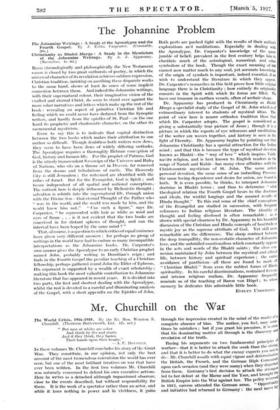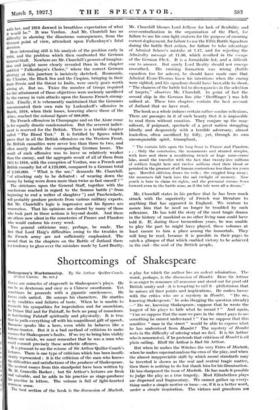Mr. Churchill on the War The World Crisis, 1916-1918. By
the Rt. Hon. Winston S. Churchill. (Thornton Butterworth, Ltd: 42s. net.)
" But men at whiles are sober And think by fits and starts And if they think, they fasten Their hands upon their hearts."
—A. E. Hot:saws.
IN these volumes Mr. Churchill-concludes his story of the Great War. They constitute, id Our opinion, not 'only the hest ascot:int) of the most tremendous Convulsitin the world has ever seen, but one of the most brilliant treatises on war that have ever been written. In the first two volumes Mr. Churchill was naturally concerned to defend his own executive actions. Here he writes as a detached although impassioned observer, close to the events described, but -without responsibility for them. It is the work of a spectator rather than an actor, and . while it loses nothing in power and 10 "Vividneiss, it 'gains. through the impression created in the mind of the reader of ) complete absence of bias. The author, you feel, may son"- times be mistaken ; but if you grant his premises, it is elos that his dominating motive all through is the discovery and revelation of the truth.
Basing his arguments on two fundamental principles of warfare—that it is better to attack the weak than the strong. and that it is better to do what the enemy expects you not to do—Mr. Churchill assails with equal vigour and determination the -British, the French, and the German High Commands upon each occasion (and they were many) when they departed from them. Germany's first decision to attack the strong° led to her defeat at the Marne and the Yser,
and brought t British Empire into the War against her. The policy in 1915, success attended the German arms. " DpPor and initiative had returned to Germany : the next move uu with her, and 1916 dawned in breathless expectation of what it would be." It was Verdun. And Mr. Churchill has no difficulty in showing the disastrous consequences, from the German point of view, attendant upon Falkenhayn's fatal decision. More interesting still is his analysis of the position early in 1916, and the problem which then confronted the German General Staff. Nowhere are Mr. Churchill's powers of imagina- tion and insight more clearly revealed than in the chapter entitled " Falkenhayn's Choice," where the correct German strategy at this juncture is incisively sketched. Roumania, the Ukraine, the Black Sea and the Caspian, bringing in their train Persia and the threat to India, were surely goals worth aiming at. But no. Twice the number of troops required for the attainment of these objectives were uselessly sacrificed by the enemy in vain attacks upon the famous French strong- hold. Finally, it is vehemently maintained that the Germans consummated their own ruin by Ludendorff's offensive in March, 1918, when their losses, towering above those of the Allies, reached the colossal figure of 688,000.
The French offensives in Champagne and on the Aisne come in for equally drastic condemnation. But the severest indict- ment is reserved for the British. There is a terrible chapter called " The Blood Test." It is fortified by figures which prove that in all the British offensives on the Western Front, the British casualties were never less than three to two, and often nearly double the corresponding German losses. The result of each offensive was to leave us relatively weaker than the enemy, and the aggregate result of all of them from 1915 to 1916, with the exception of Verdun, was a French and British casualty list of 4,123,000, compared to a German total of 2,166,000. " What is the use," demands Mr. Churchill, "of attacking only to be defeated : of wearing down the enemy by being worn down more than twice as fast oneself ? "
The strictures upon the General Staff, together with the conclusions reached in regard to the Somme battle (" from beginning to end a welter of slaughter ") and Paschendaele, will probably produce protests from various military experts. But Mr. Churchill's logic is impressive and his figures are remorseless. That his opinions are shared by many of those who took part in these actions is beyond doubt. And there are others now silent in the cemeteries of France and Flanders who would endorse his every word.
Two general criticisms may, perhaps, be made. The first that Lord Haig's difficulties owing to the troubles in the French army are not sufficiently emphasized. The second that in the chapters on the Battle of Jutland there is a tendency to gloss over the mistakes made by Lord Beatty.
Mr. Churchill blames Lord Jellieoe for lack of flexibility and over-centralization in the organization of the Fleet, for failure to use his own light cruisers for the purpose of ensuring correct deployment, for failure to use the Fifth Battle Squadron during the battle fleet action, for failure to take advantage of Admiral Scheer's mistake at 7.17, and for rejecting the Admiralty message at 11.30, which resulted in the escape of the German Fleet. It is a formidable list, and a difficult one to answer. But surely Lord Beatty should not emerge unscathed. His cruising formation was wrong (battle squadron too far astern), he should have made sure that Admiral Evan-Thomas knew his intentions when the enemy were sighted, and his squadron should have been able to shoot. " The chances of the battle led to discrepancies in the selection of targets," observes Mr. Churchill. In point of fact the second ship in the German line (the Derfllinger ') was left unfired at. These two chapters contain the best account of Jutland that we have read.
The book as a whole induces certain rather sombre reflexions. There are passages in it of such beauty that it is impossible to read them without emotion. They conjure up the mag- nificent, if poignant, spectacle of a great nation struggling blindly and desperately with a terrible adversary, almost leaderless, often sacrificed by folly, yet, through its own unconquerable spirit, triumphant.
" The curtain falls upon the long front in France and Flanders. . . . Only the cemeteries, the monuments and stunted steeples, with here and there a mouldering trench or huge mine-crater lake, assail the traveller with tho fact that twenty-five millions of soldiers fought here and twelve millions shed their blood or perished in the greatest of all human contentions less than ten years ago. Merciful oblivion draws its veils ; the crippled limp away ; the mourners fall back into the sad twilight of memory. New youth is hero to claim its rights, and the perennial stream flows forward even in the battle zone, as if the tale were all a dream."
Mr. Churchill states in his preface that he has been much struck with the superiority of French war literature to anything that has appeared in England. We venture to assure hint that he need no longer be troubled by such reflexions. He has told the story of the most tragic drama in the history of mankind as no other living man could have told it. If, during these tremendous years, he was unable to play the part he might have played, these volumes at least ensure to him a place among the immortals. They will long be read, because it is possible in their pages to catch a glimpse of that which enabled victory to be achieved in the end—the soul of the British people.































































 Previous page
Previous page